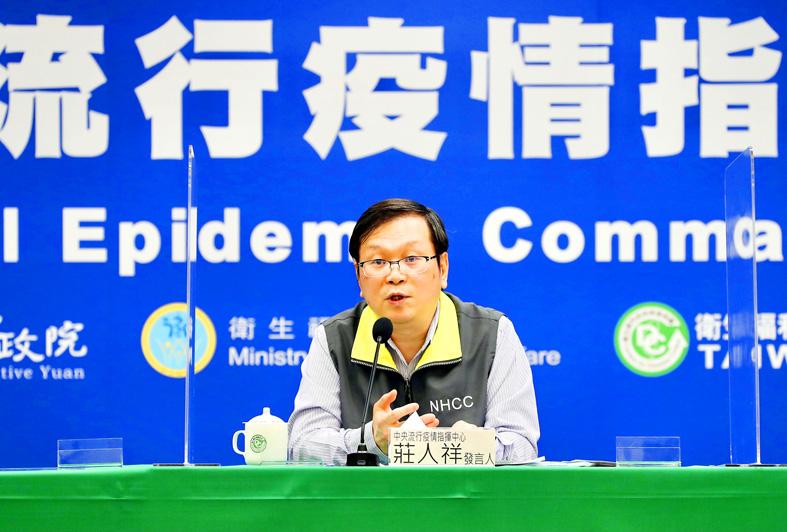Premier Su Tseng-chang (蘇貞昌) and Minister of Health and Welfare Chen Shih-chung (陳時中) are to be the first people in Taiwan to receive the AstraZeneca COVID-19 vaccine, at National Taiwan University Hospital in Taipei today, the Central Epidemic Command Center (CECC) said yesterday.
As today is the first day of COVID-19 vaccination for frontline healthcare workers most likely to have direct exposure to COVID-19 patients, Su yesterday said he had asked the CECC specialist advisory panel for an assessment and that he would get a shot of the AstraZeneca vaccine today.
The panel last week suggested that Su and Chen take the lead in the nation’s inoculation drive to reassure the public that the vaccine is safe, as concerns were raised after a few countries partially suspended AstraZeneca vaccinations due to some reported cases of blood clots.

Photo: CNA
At the CECC’s news conference, Centers for Disease Control (CDC) Deputy Director-General Chuang Jen-hsiang (莊人祥), who is the CECC’s spokesman, confirmed that Su and Chen would arrive at the hospital at 7:40am to be vaccinated.
Asked whether Su, who is over 65, should receive the vaccine, Chuang said the AstraZeneca vaccine is not being given to people aged 65 or older in some countries, because there were fewer older participants in the vaccine’s clinical trials.
However, the AstraZeneca vaccine is being offered to people aged 65 or older in the UK and some European countries, as well as South Korea, which initially had not approved the vaccine for the age group, he said.
So far there have been no abnormal effects reported after vaccination in this age group, he added.
The CECC on Friday held an online meeting with local health departments and 57 hospitals that would be offering the vaccine to explain the vaccination procedure, Chuang said.
An Advisory Committee on Immunization Practices meeting was also held on Friday, and the specialists decided to include a few precautionary tips recommended by the European Medicines Agency in the consent form for COVID-19 vaccination in Taiwan, he said.
Asked about a report by Shanghai health authorities that a traveler from Taiwan who arrived in the city on Wednesday was confirmed to have COVID-19 yesterday, Chuang said the center has contacted authorities in Shanghai for more details, but there has been no response yet.
Separately yesterday, the CECC reported an imported case of COVID-19.
The case is a Taiwanese who traveled to Poland for business in November last year, Chuang said.
He returned to Taiwan on Feb. 25 and was quarantined at a hotel because he did not show any symptoms upon arrival, he said.
However, the man on March 1 said he had developed a mild cough, but did not report it to the local health department, as he thought the symptom was not serious.
Chuang said the man returned home on March 10 and continued to practice self-health management, and the result of a paid COVID-19 test on Friday came back positive yesterday.

The CIA has a message for Chinese government officials worried about their place in Chinese President Xi Jinping’s (習近平) government: Come work with us. The agency released two Mandarin-language videos on social media on Thursday inviting disgruntled officials to contact the CIA. The recruitment videos posted on YouTube and X racked up more than 5 million views combined in their first day. The outreach comes as CIA Director John Ratcliffe has vowed to boost the agency’s use of intelligence from human sources and its focus on China, which has recently targeted US officials with its own espionage operations. The videos are “aimed at

STEADFAST FRIEND: The bills encourage increased Taiwan-US engagement and address China’s distortion of UN Resolution 2758 to isolate Taiwan internationally The Presidential Office yesterday thanked the US House of Representatives for unanimously passing two Taiwan-related bills highlighting its solid support for Taiwan’s democracy and global participation, and for deepening bilateral relations. One of the bills, the Taiwan Assurance Implementation Act, requires the US Department of State to periodically review its guidelines for engagement with Taiwan, and report to the US Congress on the guidelines and plans to lift self-imposed limitations on US-Taiwan engagement. The other bill is the Taiwan International Solidarity Act, which clarifies that UN Resolution 2758 does not address the issue of the representation of Taiwan or its people in

US Indo-Pacific Commander Admiral Samuel Paparo on Friday expressed concern over the rate at which China is diversifying its military exercises, the Financial Times (FT) reported on Saturday. “The rates of change on the depth and breadth of their exercises is the one non-linear effect that I’ve seen in the last year that wakes me up at night or keeps me up at night,” Paparo was quoted by FT as saying while attending the annual Sedona Forum at the McCain Institute in Arizona. Paparo also expressed concern over the speed with which China was expanding its military. While the US

SHIFT: Taiwan’s better-than-expected first-quarter GDP and signs of weakness in the US have driven global capital back to emerging markets, the central bank head said The central bank yesterday blamed market speculation for the steep rise in the local currency, and urged exporters and financial institutions to stay calm and stop panic sell-offs to avoid hurting their own profitability. The nation’s top monetary policymaker said that it would step in, if necessary, to maintain order and stability in the foreign exchange market. The remarks came as the NT dollar yesterday closed up NT$0.919 to NT$30.145 against the US dollar in Taipei trading, after rising as high as NT$29.59 in intraday trading. The local currency has surged 5.85 percent against the greenback over the past two sessions, central